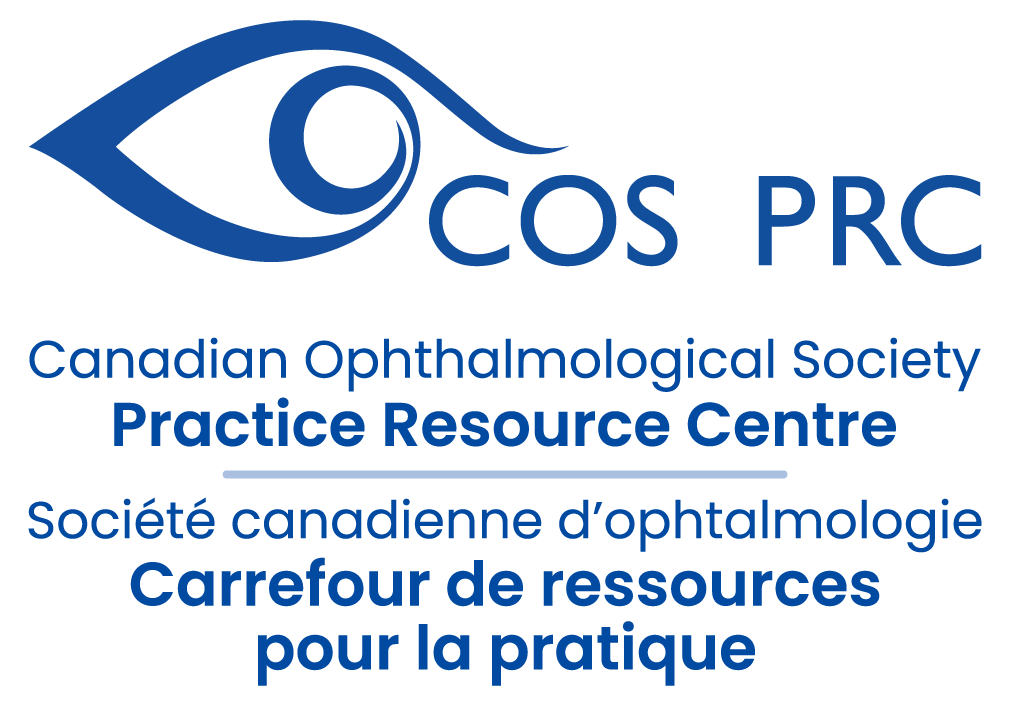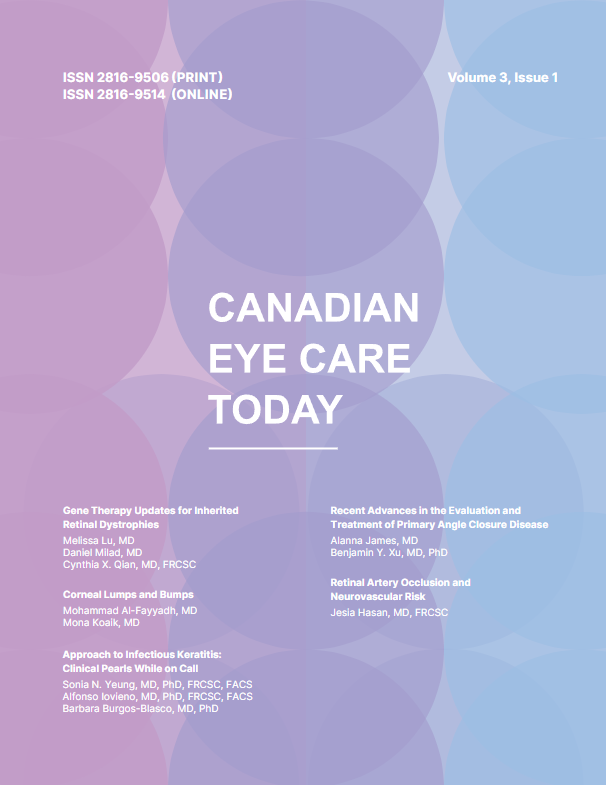Explore the Practice Resource Centre

EXPLORE THE PRACTICE RESOURCE CENTRE – we are pleased to share the new PRC promotional video. In just over two minutes, we highlight the benefits of the site for seasoned practitioners and those just starting their career, how to easily submit ideas and resources, how to create a custom reading list, and much more.
Glaucoma OCT Interpretation: 101
Glaucoma OCT Interpretation is an online, Section 3 accredited course available at EyeCarePD.com. A game-based approach is applied to learning OCT interpretation. This course covers commonly encountered OCT presentations of glaucoma as seen on standard optic nerve head and retinal nerve fiber layer scan protocols with the purpose of improving interpretation skills using perceptual learning strategies.
Getting started is easy:
- Using the Google Chrome browser, navigate to https://eyecarepd.com/catalog/glaucoma-group/
- Select Glaucoma OCT Interpretation 101 (COS Accredited) and add the product to the cart
- At checkout, use the coupon code ECPDCOSGLAUCOMA to set the price to 0.
- Your course is now available under My Courses at the top of the screen.
Learning Objectives:
- Identify segmentation errors and their role in OCT scan interpretation
- Utilize varying sections of the OCT report including tabular data, sector analysis and graphical displays
- Interact with expert interpretation in order to compare their findings in selected cases
Accreditation
This activity is an Accredited Self-Assessment Program (Section 3) as defined by the Maintenance of Certification program of the Royal College of Physicians and Surgeons of Canada. This web-based lesson was approved by the COS on October 23rd, 2020 and expires October 2023. Remember to visit MAINPORT to record your learning and outcomes. You may claim a maximum of 1 hour (credits are automatically calculated).
This activity was co-developed with EyeCarePD and the Canadian Ophthalmological Society (COS) and was planned to achieve scientific integrity, objectivity and balance.
Access Details
To participate in this course visit https://eyecarepd.com/catalog/glaucoma-group/


DOVS GRAND ROUNDS – Beyond the Vaccine: Uveitis in the Era of COVID-19 Immunization – VIA ZOOM
Date: Friday April 12, 2024
Time: 7:30 AM – 8:30 AM (Eastern Standard Time)
Title: Beyond the Vaccine: Uveitis in the Era of COVID-19 Immunization
Speaker: Dr. Larrisa Derzko
Zoom Link: Register in advance for this webinar
After registering, you will receive a confirmation email containing information about joining the webinar.
Objectives:
1. To discuss uveitis presentations related to COVID-19 vaccination;
2. To understand mechanisms and treatment of uveitis post COVID-19 vaccination;
3. To review current recommendations for managing patients with vaccine associated uveitis or pre-existing uveitis in the era of COVID-19 immunization.
The VPP Grand Rounds Local and Visiting Professor Program is a self-approved group learning activity (Section 1) as defined by the Maintenance of Certification program of The Royal College of Physicians and Surgeons of Canada. You will be able to claim 1 credit for this round.
Solar Eclipse Safety – Q&A

Looking directly at the sun without proper protection can cause significant damage to your eye leading to a condition called solar retinopathy. During unshielded observation of a solar eclipse, the lens of the eye acts just like a magnifying glass, focusing the sun’s rays onto the retina at the back of the eye. This concentrated energy can result in permanent burns of the retina, and even irreversible blind spots.
The retina has no pain receptors. Therefore, it can take time before someone realizes that retinal damage may have occurred. You should be attentive to signs such as a blurry vision, visual distortion, and decreased colour vision and if you have looked at the solar eclipse without eye protection.
Let’s delve into some commonly asked questions about solar retinopathy and solar eclipse safety, and expert answers to equip both patients and providers with valuable insight during this event.
Commonly asked questions and answers
Q: What is the best primary prevention?
A: Refraining from viewing the solar eclipse is the best primary prevention to solar retinopathy. You can safely view the event indirectly, by TV or web.
Q: Which glasses are unsafe?
A: Sunglasses, glasses with transition lenses, glasses with polarizing filters, exposed film, x-ray film, and neutral density filters, do not provide enough safety to view the eclipse.
It is equally unsafe to view the eclipse from your telescope, camera, binoculars without the appropriate special filter, or through a window without the correct eye protection.
Q: Can one take pictures of the eclipse with a smartphone?
A: You can take pictures of the eclipse with your smartphone or tablet device, but make sure that you are not viewing the eclipse without the proper eye protection while aligning the device for the photo. Please keep in mind that some manufacturers state that prolonged pointing of the smartphone/camera to the sun may affect its sensors.
Q: What is the right filter to have when viewing the eclipse?
A: ISO 12312-2 certified. Upon receiving your glasses, please take the time to inspect as the glasses should not be scratched or torn. If the glasses are being worn by children, ensure that they are supervised at all times.
Q: What is the maximum duration of time that we can view the solar eclipse without permanent damage? What if I glance at the eclipse, look away, and then back again?
A: There is no duration of time that you can view the eclipse without permanent damage! The effects of the damage by the sun are cumulative, so looking at the eclipse multiple times would do more damage than looking at it once. It is advised that you do not look directly at the sun at all.
Please keep in mind that if on the totality path, to use great caution and under expert supervision to indicate the time that you may securely remove and put back on the certified glasses.
Q: Can animals suffer from solar retinopathy as well?
A: In theory, yes, if they are looking at the sun during the eclipse.
Q: Can someone with a previous history of ocular disease view the eclipse?
A: Yes, but only with precaution and the correct eye protection. If unsure, they can enjoy the solar eclipse by viewing it indirectly (such as through a livestream or broadcast on TV).
Resources
The authors of this Q&A on solar eclipse eye safety have compiled a comprehensive set of resources tailored to both patients and ophthalmologists, ensuring that everyone can access reliable information and guidance.
For the general public
Government of Canada – Stay safe while watching the solar eclipse
American Astronomical Society – Viewing the solar eclipse safely
Exploratorium – View the eclipse safely through livestream
Association des médecins ophthalmologistes du Québec – Éclipse solaire du 8 avril (French only)
Canadian Ophthalmological Society – Protect your vision
The Dose – How can I watch a solar eclipse and keep my eyes safe?
For the ophthalmologist
American Academy of Ophthalmology EyeWiki – Solar retinopathy
The Astronomical Journal – Physical and visual evaluation of filters for direct observation of the sun and the international standard ISO
Queen’s University – Grand Rounds Presentation: Total solar eclipse and eye health
Ophthalmology Times – Protecting vision during solar eclipses: Insights for ophthalmologists
Thank you to Dr. Marie-Josée Aubin and Dr. Cynthia Qian for creating this helpful resource!
COS – THE EYECAN PODCAST- New Episodes!
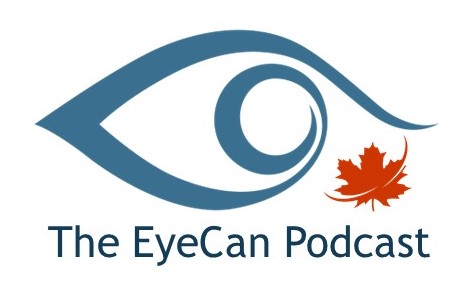
The podcast features guest speakers from across Canada and innovative practitioners from around the world discussing diverse topics and how they impact ophthalmology. Topics range from emerging techniques and technologies to building individual resilience as Canadian physicians. Through it all, this podcast aims to build connections within the ophthalmological community, share our experiences, and to truly promote the value the profession brings to the lives of patients.
Click here to listen on Apple Podcasts
Click here to listen on Spotify
Click here to listen on COS Media Player
Episode Guide Season 4
| Episode 1: Sustainability in Ophthalmology w/guest Dr. Marie-Claude Robert Episode 2: Age-related Macular Degeneration w/guest Dr. Ravi Dookeran Episode 3: Dr. Phil Hooper, COS President – President’s Episode Episode 4: Myopia – Can we slow down the growth? w/guest Dr. Vivian Hill Episode 5: Upcoming Challenges in Retina w/guest Dr. Shaheer Aboobaker Episode 6: Genetic Testing w/guest Dr. Sarah Chorfi |
Episode Guide Season 3
| Episode 1: Dr. Phil Hooper, COS President – Vision for 2023 and Beyond Episode 2: Fixing Canadian Health Care w/guest Dr. Robert Bell Episode 3: Advocacy, Awareness and the National Vision Health Desk w/guest Dr. Vivian Hill Episode 4: The Patient’s Journey w/guest Doug Purdy Episode 5: Women in Ophthalmology w/guest Dr. Yvonne Buys & co-hosts Dr. Mona Dagher and Dr. Hady Saheb Episode 6: Physician Health and Wellness, w/guest Susan Biali Haas Episode 7: Dealing with Complaints Against your Practice w/guest Rishi Gupta Episode 8: Ocular Oncology w/guest Dr. Carol Shields Episode 9: Innovations in Retina Therapies w/guest Dr. David Brown Episode 10: Artificial Intelligence w/guest Dr. Netan Choudhry Episode 11: Tele-ophthalmology w/guest Dr. David Maberley Episode 12: Canadian Ophthalmological Society Foundation w/guest Dr. Guillermo Rocha |
Episode Guide Season 2
| Episode 1: Intro to Season 2 and Part 1 of w/guest Lauren Brecher Episode 2: Intro to Season 2 and Part 2 of w/guest Lauren Brecher Episode 3: Being a resident today w/guest Dr. Michael Nguyen Episode 4: Host Dr. Guillermo Rocha interviews another host, Dr. Setareh Ziai. Episode 5: Strabismus Surgery w/guest Dr. Yi Ning J. Strube Episode 6: Equity, Diversity, and Inclusion w/guest Dr. Nupura Bakshi Episode 7: 2022 at the Canadian Ophthalmological Society w/guest Dr. Colin Mann Episode 8: Talking Markets and Investments with MD Financial w/guest Craig Maddock and Ian Taylor Episode 9: Bioinformatics, deep learning, and clinical epidemiology w/guest Dr. Cecilia Lee Episode 10: Mindfulness and Physician Wellness w/guest Dr. Agnes Wong Episode 11: Global Ophthalmology w/guest Dr. Vivian Yin |
Episode Guide Season 1
| Episode 1: Podcast introduction and working in COVID Episode 2: Gene Therapy ft. Dr. Robert K. Koenekoop Episode 3: Innovation in Glaucoma ft. Dr. Hady Saheb Episode 4: COVID-19 Second wave and beyond ft. Dr. James Chodosh Episode 5: Navigating Retirement ft. Dr. Yvonne Buys Episode 6: Physician Wellness w/guest Dr. Nina Ahuja Episode 7:The COS in 2021 w/guests Dr. Colin Mann and Elisabeth Fowler Episode 8: Competence by Design w/guest Dr. Stephanie Baxter Episode 9: The Eye Bank w/guest Dr. Clara Chan Episode 10: Innovating During a Pandemic w/guest Dr. Ike Ahmed Episode 11: Physician-focused Financial Advice w/MD Financial Management |
World Ophthalmology Congress 2024
Join the International Council of Ophthalmology for their 39th World Ophthalmology Congress® (WOC2024®), taking place in the exciting city of Vancouver, Canada from August 16th to 19th 2024. The Vancouver Convention Center is a stunning waterfront landmark that offers convenient access to all the major visitor amenities in downtown Vancouver.
WOC2024® will once again bring together the world ophthalmology community and those who work with them for a uniquely immersive learning experience designed to shape the future of sight. Benefit from the WOC2024® scientific program comprising all eye care subspecialties to stay up to date with the latest research and trends in ophthalmology.
With discounted early bird registration rates available until April 15, 2024, now is the perfect time to register. Enjoy interactive sessions with society symposia, surgical wetlabs, subspecialty days, industry symposia, and poster presentations, as well as invaluable networking opportunities
For more information, CLICK HERE.
Eyes on Oncology – Navigating corneal adverse events associated with antibody drug conjugates in oncology
The Master Clinician Alliance (MCA) is providing a Section 3 accredited online self-assessment program focusing on ocular AE assessment and management. Navigate through a learning path that includes a pre- and post-questionnaire, patients cases, knowledge questions as well as presentations.
QUICK AND EASY PARTICIPATION, NO ZOOM MEETINGS! Simply complete the program on your own, conveniently from your mobile device or computer. The program is expected to take about 1 hour to complete. Please note that the program is available in English and French.
Learning objectives:
By the end of this learning session, you will be able to:
- Describe the mechanisms of action and design of antibody drug conjugates (ADCs)
- Recognize the corneal toxicities caused by ADCs and propose appropriate corneal adverse event (AE) management strategies to minimize ocular complications
- Implement effective communication and coordination strategies to enhance collaborative care for oncology patients experiencing corneal toxicities
To register for this self-assessment program, please click HERE.
Canadian Eye Care Today: Volume 3, Issue 1
The latest issue of Canadian Eye Care Today is now available! This publication features clinical perspectives and practical information on topics in eye care relevant to today’s clinician. Its peer-reviewed articles focus on the treatment and management of eye disease from a Canadian perspective.
The content of this issue includes:
- Gene Therapy Updates for Inherited Retinal Dystrophies
- Melissa Lu, MD; Daniel Milad, MD; Cynthia X. Qian, MD, FRCSC.
- Recent Advances in the Evaluation and Treatment of Primary Angle Closure Disease
- Alanna James, MD; Benjamin Y. Xu, MD, PhD.
- Corneal Lumps and Bumps
- Mohammad Al-Fayyadh, MD; Mona Koaik, MD.
- Retinal Artery Occlusion and Neurovascular Risk
- Jesia Hasan, MD, FRCSC.
- Approach to Infectious Keratitis: Clinical Pearls While on Call
- Sonia N. Yeung, MD, PhD, FRCSC, FACS; Alfonso Iovieno, MD, PhD, FRCSC, FACS; Barbara Burgos-Blasco, MD, PhD.
To access the latest issue, click on the picture below!
CJO: February 2024 Issue Highlights
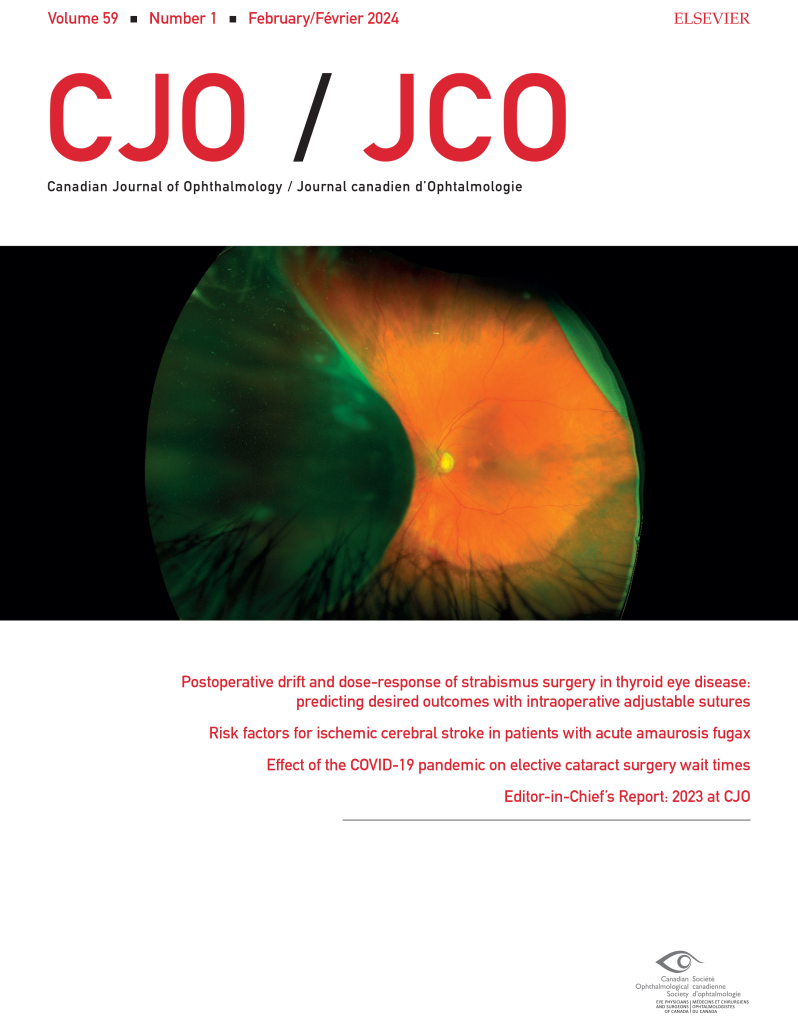
The February 2024 CJO is now available online. Here are some of the highlights:
Editor-in-Chief’s report: 2023 at CJO: In this editorial, Dr. Varun Chaudhary highlights some of the CJO’s key accomplishments and outcome metrics from 2023, including another significant increase in the journal’s Impact Factor, which now sits at 4.2.
Resident Perspectives + visual abstract: Our talented team of residents have summarized 3 articles with a focus on what’s most relevant to ophthalmology learners here in Canada and around the globe. In addition, our February visual abstract provides a visual summary of an article on Risk factors for ischemic cerebral stroke in patients with acute amaurosis fugax.
Original research articles:
- Analysis of ophthalmology subspeciality opioid prescribing patterns during the opioid public health crisis
- Safety and efficacy of micropulse transscleral cyclophotocoagulation
- Use of virtual care in ophthalmology in Ontario, Canada in 2020 during the COVID-19 pandemic
- Equity, diversity, and inclusion landscape in Canadian postgraduate medical education for ophthalmology
- Multifocal electroretinographic findings in angiographic macular leakage in the setting of intermediate, posterior, or panuveitis
Research letters, photo essays, and case reports:
- Comparison of ChatGPT to ophthalmology resident and staff consultants on an ophthalmological training tool [research letter]
- Text-to-image artificial intelligence models for preoperative counselling in oculoplastics [research letter]
- Cilioretinal artery occlusion secondary to central retinal vein occlusion [photo essay]
- Retinal ischemic perivascular lesions and sickle cell maculopathy [photo essay]
- Strabismus in early disseminated Lyme disease: case report and summary of the literature [case report]
- Poor response of solitary optic disc retinal capillary hemangioblastoma to intravitreal propranolol [case report]
- Blockchain technology: revolutionizing ophthalmology and patient-centered care [correspondence]
Follow the CJO on social media:
Facebook: CanJOphth
Instagram: @cjo_jco
LinkedIn: CJO – JCO
Twitter: @CanJOphth
Artificial Intelligence – Applications and Challenges in Ophthalmology
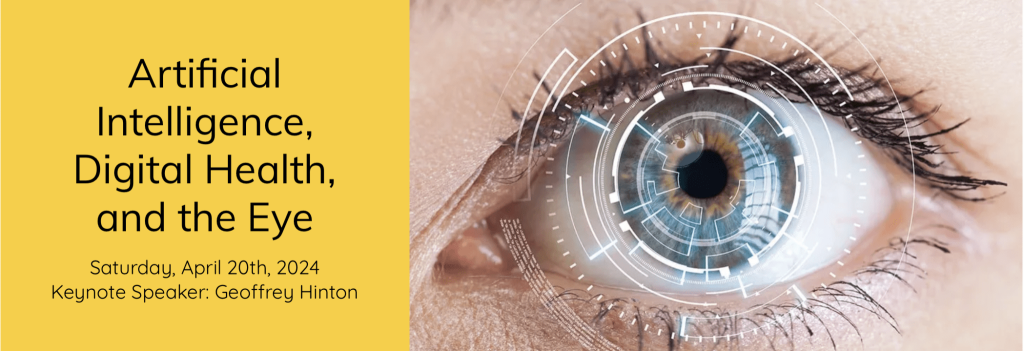
Location: VIRTUAL
Date: April 20th, 2024
This masterclass is a collaboration between the University of Toronto, surgeons at Moorfields Eye Hospital, the Canadian Priory of the Order of St John and the postgraduate arm of St John’s Eye Hospital Group. Please join them on a Zoom Webinar for a hybrid masterclass, dedicated to applications of Artificial Intelligence, Deep Learning, and Machine Learning in Ophthalmology.
This unique and multidisciplinary gathering is aimed at the clinician with minimal computer science background and will highlight promising areas of research and development.
Professor Geoffrey Hinton, co-winner of the 2018 Turing Prize in Computer Science, will be their keynote speaker.
For more information on registration and the number of credits you can obtain for this accredited activity, please click HERE.
International Conference on Physician Health – Call for Abstracts
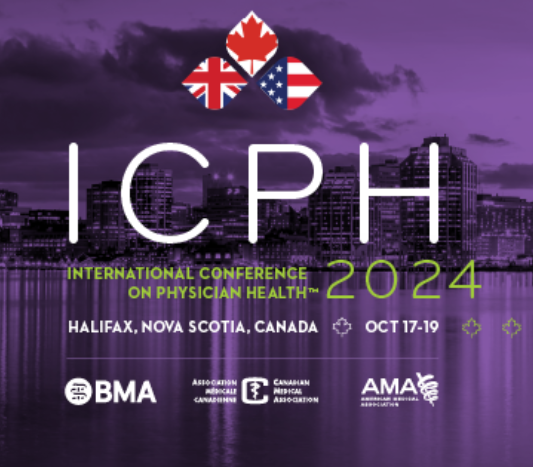
Doctors are people, too. Making meaningful connections—with each other, with patients, and within our health systems—is integral to physicians’ health and well-being. The International Conference on Physician Health (ICPH) 2024 is an opportunity for physicians and researchers from Canada, the United States and United Kingdom to learn from each other, network around their work and connect on issues that matter. Showcase your work, share your knowledge and engage your peers by submitting an abstract for written posters, oral, panel and workshop presentations by April 12, 2024.
Location: Halifax, Nova Scotia, Canada
Date: October 17 – 19th, 2024
For more information about registration and the conference, click HERE.
To submit an abstract, click HERE.
